The Love Triangle Spread

Difficulty: Complicated
Casually referred to as the Love Triangle, this spread can be used to determine the dynamics of the relationship between three people, regardless of whether romance is involved. This spread is arranged in the form of a hexagram, consisting of several large and small triangles. This tarot spread may seem somewhat complicated, but it is not entirely that difficult.
The first step is to interpret the card for each individual position in the spread. Generally, one might ask about a relationship they are involved in, but this does not have to be the case. Ordinarily, the reader's representative card is #1, their main person of interest is #2, and the other person would be #3.
The second step fills in the downward triangle and involves further examination of the individuals through their views of the other people. Each person has two more cards showing the way they see and relate to the other members of the triangle. For example, Card #6 indicates how Person #3 relates to Person #1, while Card #9 stands for Person #1's attitude toward Person #3.
The next step completes the upward triangle and the hexagram, focusing on cards #10–13. It also completes the many smaller triangles and hints at the potential for each relationship. The final card, #13 can be considered the significator of the reading, which suggests the overall potential for this three-way relationship.
Your Love Triangle Reading
| P#3 | 3to2 | 2+3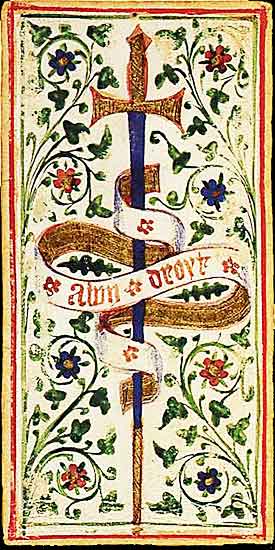 |
2to3 | P#2 | ||
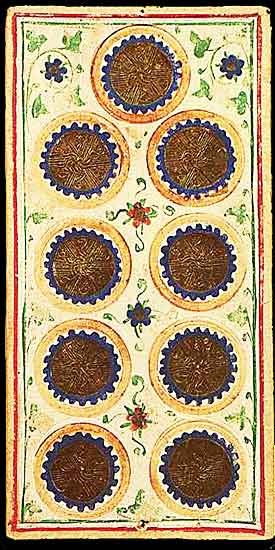 |
3to1 |  |
Overall | 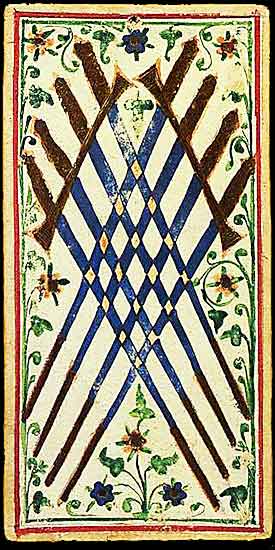 |
2to1 | 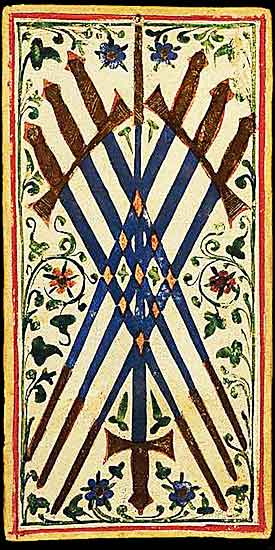 |
| 1+3 | 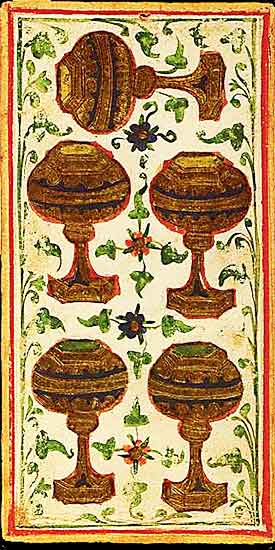 |
1to3 |  |
1to2 |  |
1+2 |
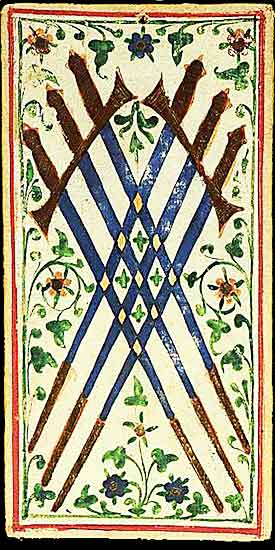 |
 |
P#1 | 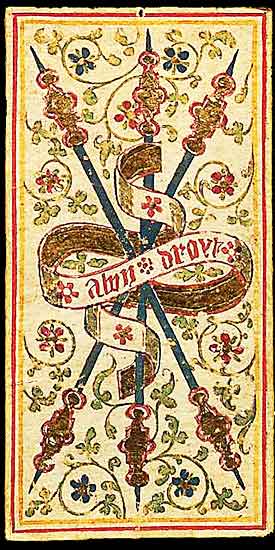 |
 |
||
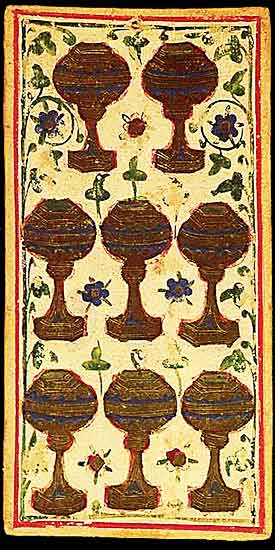 |
1: Person #1

The Eight of Cups represents emotional departure, seeking something deeper, and the decision to walk away from what no longer serves you. It speaks to the need for introspection and self-discovery, as you leave behind the superficial in search of deeper meaning.
Symbolism: The eight chalices in staggered rows suggest a gradual departure or transition. The placement emphasises movement and emotional progression. The ornate details of the cups reflect the emotional investment required to make this decision.
In Relationships: A decision to move on from a relationship or emotional situation that no longer fulfils you. This card represents a quest for deeper connection or personal growth.
In Work: Leaving behind a job or situation that no longer aligns with your values or goals. The Eight of Cups suggests you are ready to pursue something more meaningful.
Spiritually: The journey towards deeper spiritual fulfilment. This card invites you to leave behind outdated beliefs or practices in search of greater understanding.
When ill-dignified: Running away from emotional problems or avoiding growth. The Eight of Cups warns against making impulsive decisions or leaving before you've fully processed emotions.
2: Person #2

The Seven of Swords represents secrecy, deception, and strategy. It speaks to situations where you may feel the need to be clever, sneaky, or evasive to get what you want. This card can indicate an act of stealth or even betrayal, but it also highlights the need for careful planning and discretion.
Symbolism: The unbalanced arrangement of the swords suggests movement, stealth, and uncertainty. The overlapping blades hint at hidden motives or the complexity of a situation that requires more than just straightforward action.
In Relationships: Hidden agendas or deception. The Seven of Swords advises caution, as someone may not be entirely honest with you or you may be hiding something.
In Work: Strategic planning or taking calculated risks. The Seven of Swords can suggest that you are working behind the scenes to achieve your goals, but caution is needed to avoid deceit.
Spiritually: Secrets or hidden truths within your spiritual path. This card encourages you to examine any areas where dishonesty or avoidance might be hindering your growth.
When ill-dignified: Betrayal, dishonesty, or evasion. The Seven of Swords warns against deceitful actions or neglecting the truth for personal gain.
3: Person #3

The Nine of Coins represents self-sufficiency, abundance, and material comfort. It signifies a time of enjoyment, where hard work has paid off, and you can enjoy the fruits of your labour. This card celebrates the pleasures of luxury, refinement, and personal achievement.
Symbolism: The stacked arrangement of nine coins reflects abundance and harmony. The stable design conveys accomplishment, stability, and satisfaction.
In Relationships: A relationship that is self-sufficient and fulfilling. The Nine of Coins suggests enjoying the fruits of love and mutual respect, with a sense of independence.
In Work: Financial success and personal achievement. This card represents enjoying the rewards of your hard work and attaining a comfortable, stable position in your career.
Spiritually: Fulfilment and the joy of having reached a place of peace and abundance in your spiritual journey.
When ill-dignified: Over-indulgence, isolation, or dependence. The Nine of Coins warns against relying too heavily on material comforts or becoming disconnected from others.
4: Person #1's view of #2

The Three of Staves represents progress, expansion, and the results of initial efforts. It signifies a moment of growth where the seeds of potential are beginning to bloom into tangible results.
Symbolism: Three crossing staves evoke stability and forward motion. The slight variations in bark texture symbolise growth, as even though the path is steady, each step brings new lessons and experiences. The harmonious arrangement represents the alignment of efforts, bringing about balance as you move towards your goals.
In Relationships: Expansion of your emotional connection or relationship. The Three of Staves signifies a positive progression, whether in deeper commitment or new shared experiences.
In Work: Growth and advancement in your professional life. This card marks the fruiting of previous efforts and signals that success is on the horizon.
Spiritually: The Three of Staves invites you to continue your spiritual journey confidently, for your path aligns with your higher purpose.
When ill-dignified: A lack of growth or stagnation. This may indicate that you are not making progress or your current actions are not leading to the desired results.
5: Person #2's view of #3

The Eight of Swords represents restriction, feeling trapped, and mental entanglement. It suggests a period of limitation or confusion, where you may feel stuck or constrained by your circumstances or thoughts. This card points to the mental barriers you may have created for yourself.
Symbolism: The interwoven swords evoke a sense of entrapment or restriction, highlighting how mental or emotional limitations can keep you bound. The design suggests the situation may be self-imposed, and the way forward is through clarity of thought.
In Relationships: Feeling trapped or restricted. The Eight of Swords suggests you may feel mentally or emotionally stuck, but the path to freedom lies in confronting your fears or limiting beliefs.
In Work: Mental or professional restrictions that prevent progress. This card encourages you to evaluate the factors keeping you stuck and break free from limiting patterns.
Spiritually: Spiritual imprisonment or being trapped in limiting beliefs. The Eight of Swords calls for introspection to uncover ways you might be blocking your own spiritual growth.
When ill-dignified: Overthinking, fear, or paralysis. The Eight of Swords warns against remaining in situations where you are not truly trapped but are instead allowing yourself to feel helpless.
6: Person #3's view of #1

The Five of Cups represents loss, grief, and emotional setbacks. It reflects mourning or disappointment where the focus is on what has been lost rather than what remains. This card is about emotional recovery and learning to move forward from past hurt.
Symbolism: The five chalices, with one on its side, suggest an imbalance or disruption in your emotional life. The card highlights the contrast between the four cups still standing and the spilled one, reminding you that in loss there is still something to salvage or learn from. The detailing of the cups reinforces the depth of emotional investment.
In Relationships: Emotional pain due to loss or disappointment. This card encourages processing grief and finding hope in what remains.
In Work: Setbacks or disappointment in your professional life. The Five of Cups reminds you to focus on the lessons learned and not just the losses incurred.
Spiritually: A time of mourning or spiritual disillusionment. This card invites you to heal from old wounds and rebuild your spiritual connection.
When ill-dignified: Despair, regret, or an inability to move past emotional pain. The Five of Cups warns against dwelling on the past and losing sight of new opportunities.
7: Person #2's view of #1

The Empress symbolises abundance, creativity, and nurturing energy. She represents the generative force of nature and the ability to create and sustain growth, both literally and figuratively.
Symbolism: The Empress's sceptre and crown symbolise her authority, while her shield connects her to the Visconti family lineage. The floral embroidery on her gown reflects her connection to nature and fertility. The golden background underscores her divine and regal status.
In Relationships: A time of emotional abundance and nurturing. The Empress signals love, harmony, and growth.
In Work: Creative projects flourish under the Empress's guidance. She encourages nurturing ideas and building strong foundations.
Spiritually: The Empress represents the divine feminine, inviting the seeker to embrace growth and connect with nature's rhythms.
When ill-dignified: Stagnation, overindulgence, or a smothering presence in relationships.
8: Person #3's view of #2

Temperance represents harmony, balance, and the art of blending opposites. It suggests a time of calm, careful moderation, and the synthesis of differing energies into a cohesive whole.
Symbolism: Pouring liquid from one vessel to another symbolises the balance and exchange between opposing forces—emotion and intellect, fire and water, inner and outer worlds. Her graceful posture and tranquil demeanour indicate deliberate action, emphasising that peace comes through moderation. The golden background elevates balance to the divine level, suggesting that harmony is sacred.
In Relationships: Temperance encourages balance in relationships. It asks for patience and moderation in interactions, fostering an environment where both partners can harmonise their differences.
In Work: Success comes through collaboration and maintaining equilibrium. This card advises you to blend your talents with those of others, seeking compromise rather than extremes.
Spiritually: Temperance represents spiritual equilibrium. It calls for integrating the material and spiritual worlds, balancing one's desires and needs for peace and alignment.
When ill-dignified: Imbalance, excess, or a lack of harmony. This could indicate dissonance in relationships, career, or spiritual practice, warning against overindulgence or extremes.
9: Person #1's view of #3

Justice represents fairness, balance, and accountability. It signifies the importance of truth and the consequences of one's actions, urging you to act with integrity.
Symbolism: The seated figure holds a sword and scales, embodying fairness and the enforcement of law. The richly adorned gown and golden background highlight the divine and universal nature of justice, while the knight in the background underscores executive authority.
In Relationships: A need for honesty and balance. Justice may signal the resolution of conflicts or the importance of mutual respect.
In Work: Fair rewards for effort and accountability for mistakes. Justice encourages acting with integrity and taking responsibility.
Spiritually: Justice emphasises the law of karma and the importance of living a life aligned with truth and fairness.
When ill-dignified: Bias, dishonesty, or imbalance. It warns against unfair judgements or evading accountability.
10: Overall relationship between persons #1 and #2

The World represents completion, wholeness, and the harmonious integration of all aspects of life. It is the last card of the Major Arcana, signalling the end of one journey and the beginning of another.
Symbolism: The two ethereal figures holding the globe or portal represent the union of duality and the achievement of balance. The rolling plains and distant mountains beneath the golden sky symbolise the vast potential of the world, and the figures' gesture of offering suggests a celebration of accomplishment. The card evokes cosmic harmony, completion, and the endless cycles of existence.
In Relationships: The World signifies a complete and fulfilling relationship, one where both partners are in harmony and balanced with each other. It's a time of celebration and unity.
In Work: Completion of a major goal or project. The World indicates the successful culmination of efforts, with new horizons opening up in your professional life.
Spiritually: A time of wholeness. The World signifies a sense of fulfilment and oneness with the universe, representing the final stage of spiritual evolution.
When ill-dignified: Incompletion, being stuck, or an inability to move forward. This card warns of a lack of closure or an unfinished journey that hinders your growth.
11: Overall relationship between persons #2 and #3

The Ace of Swords symbolises mental clarity, new ideas, and breakthrough moments. It represents the power of the mind to cut through confusion and offer insight, truth, and understanding. This card marks a moment of intellectual clarity, a new beginning for thought processes, and the potential to solve problems or resolve conflicts through logic and sharp perception.
Symbolism: The solitary sword represents a decisive force, a sharp intellect cutting through the fog. The flowery background highlights the clarity that accompanies the realisation or epiphany. This card invites you to embrace your mental power and use it.
In Relationships: A breakthrough in communication or understanding in your relationship. This could signify a moment of honesty or intellectual connection that clears misunderstandings.
In Work: The arrival of new opportunities for intellectual growth or clarity in your professional life. It's a time to make decisions based on logic and rational thinking.
Spiritually: Spiritual clarity or a new insight into your path. The Ace of Swords encourages you to seek the truth in your spiritual journey, embracing the power of clear thought and discernment.
When ill-dignified: Confusion, dishonesty, or unclear thinking. The Ace of Swords warns against impulsive decisions or misinterpretations.
12: Overall relationship between persons #1 and #3

The Six of Swords represents transition, moving forward, and mental clarity. It signifies a physical or mental journey towards calmer waters and a better state of mind. This card suggests moving on from a turbulent situation towards something more peaceful.
Symbolism: The six swords in crossed rows create balance, suggesting a journey that is orderly, though still in motion. The design evokes calm and progress, and the neutral background emphasises the steady movement towards clarity and peace.
In Relationships: Moving on from a difficult relationship or finding peace after emotional turmoil. The Six of Swords represents leaving the past behind and seeking harmony in new emotional terrain.
In Work: Transitioning to a new phase in your professional life, possibly leaving a challenging job or situation for a more peaceful and fulfilling one.
Spiritually: A period of spiritual transition and growth. The Six of Swords encourages you to leave behind old spiritual patterns that no longer serve you and seek inner peace and understanding.
When ill-dignified: Escaping from problems without resolving them or avoiding necessary emotional work. The Six of Swords warns against running away from unresolved issues.
13: Overall 3-way Relationship

The Knight of Cups represents emotional pursuit, idealism, and romanticism. It speaks to the pursuit of dreams, following one's heart, and embarking on emotional quests with passion and dedication.
Symbolism: The knight on horseback, holding a cup, exudes an energy of romantic idealism and emotional drive. The pale horse's steady gait and the knight's confident posture suggest a balance between passion and grace.
In Relationships: Pursuing romance with enthusiasm and idealism. The Knight of Cups suggests a time of emotional pursuit, whether the beginning of a romance or a passionate phase in an existing relationship.
In Work: A pursuit of creative or emotional fulfilment. This card represents following your heart and idealism in professional endeavours.
Spiritually: The quest for spiritual or emotional fulfilment. The Knight of Cups invites you to pursue your highest ideals and trust your intuition on your spiritual journey.
When ill-dignified: Impulsiveness, emotional highs and lows, or unrealistic expectations. The Knight of Cups warns against becoming too idealistic or pursuing unrealistic goals without grounding.